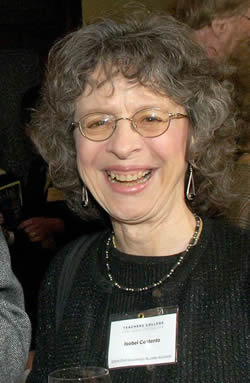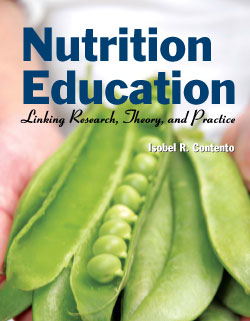Thought for Food
Isobel Contento serves up a textbook on how to educate people to eat right
Why, amid a deluge of new information about diet and cholesterol, are Americans getting steadily fatter?
"When it comes to diets, there's plenty of evidence that knowledge alone doesn't change people's eating patterns," says Isobel Contento, TC's Mary Swartz Rose Professor of Nutrition and Education. "Americans are well-informed, and at this point, the grocery stores are full of plenty of healthy foods. What people lack is the oomph to overcome barriers to changing their behavior. So the field needs behavioral, psychological and educational strategies, as well."
A new book by Contento, Nutrition Education: Linking Research, Theory and Practice, provides just those kinds of strategies to future professionals who will work with the public. The first nutrition education text ever written, and 15 years in the making, the book is decidedly not a compendium of the latest scientific theories about what constitutes good nutrition.
"The public has been getting a lot conflicting messages from the Ornishes and Adkinses of the world -- high carb, low carb -- but the message from the science-based nutrition community has been pretty steady for a while now, and that-'s basically, eat lots of whole grains, fruits and vegetables, not too many fats, and move around more" Contento says.
"This message seems simple but it often involves making changes, and people often lack the confidence that they are capable of making those changes. They say, -'I don't like the taste,' or -'It's too hard to cook all that,' or, -'I can barely walk a block, let alone walk for an hour.'
"So people need convincing that they can change, and this is an evidence-based text, focusing on change strategies that research and best practices over the past 15 years have shown to work."
Contento's book reflects her analysis of the evidence, which shows that there are three essential components to nutrition education: increasing awareness and motivation; facilitating the ability to take action; and promoting environmental supports for action -- for example, changing what's served up by restaurants and the food industry.
Contento believes that nutrition educators have a major role to play in working with individuals, families and groups to help them understand why they should take action -- what's in it for me, for my family, or my community -- and also how to take action.
"Nutrition educators also have a role in working with policymakers to make the environment supportive of action," she says. "This means working with policy-makers in schools, worksites, communities, food industry, and government to make the healthy choice the easy -- and affordable -- choice." Nutrition educators try to create a demand for healthy food and make it important to policymakers to create environments supportive of those seeking to do so."
TC's nutrition education program, which is the nation's oldest -- it will celebrate its 100th anniversary in 2009 -- has a long history of doing just that, and Contento, perhaps more than anyone else in the field, embodies the tradition. The program's coordinator since 1985, she has served on a score of national advisory committees, including the American Cancer Society's "Changing the Course" curriculum project; the Centers for Disease Control & Prevention's Guidelines for School Health Programs to Promote Lifelong Healthy Eating; and the National Academy of Sciences' Committee on Nutrition Standards for Foods in Schools. She has studied the knowledge and beliefs of high-poverty urban children about food and food systems, and how children transform and use that knowledge in their everyday lives. She is the co-developer of a science education curriculum series that teaches children about nutrition by examining the relationship between food, personal behavior, and our current food and activity environment and assists them to develop personal agency to act upon this environment.
At a recent nutrition conference held at TC in April, Contento also announced the creation of the College's new Center for Food and the Environment, which she will lead.
"What we are attempting to do in our nutrition program and through the new center," she says. "is to create a new field in which nutritionists learn enough about behavioral sciences to work effectively as behavioral nutritionists and nutrition educators, and who are also able to work to transform the environments in which food choices are made."
Published Monday, Apr. 30, 2007

